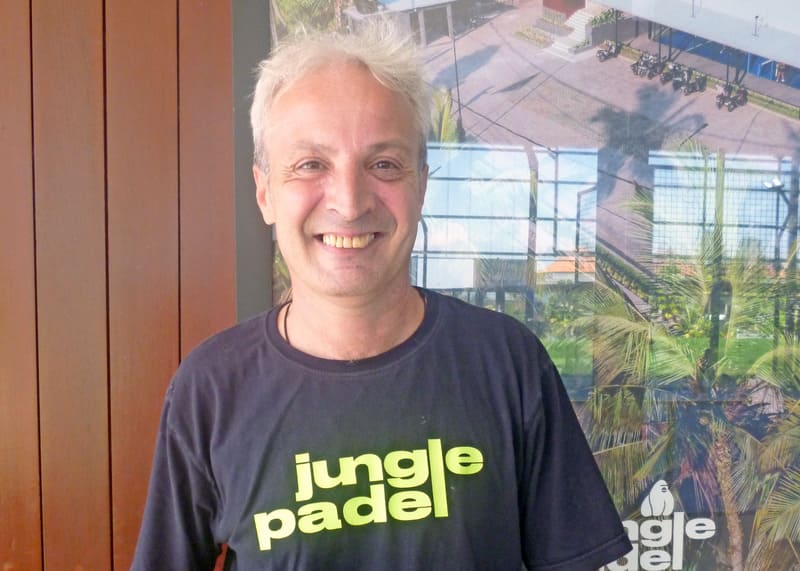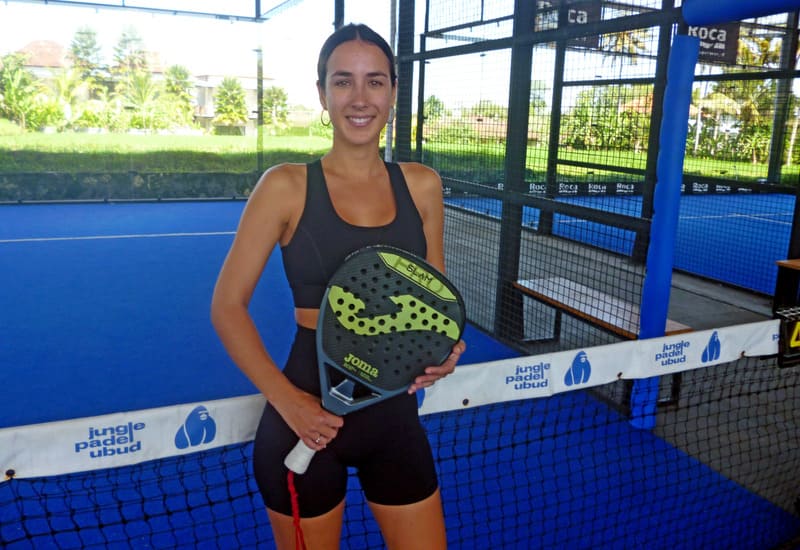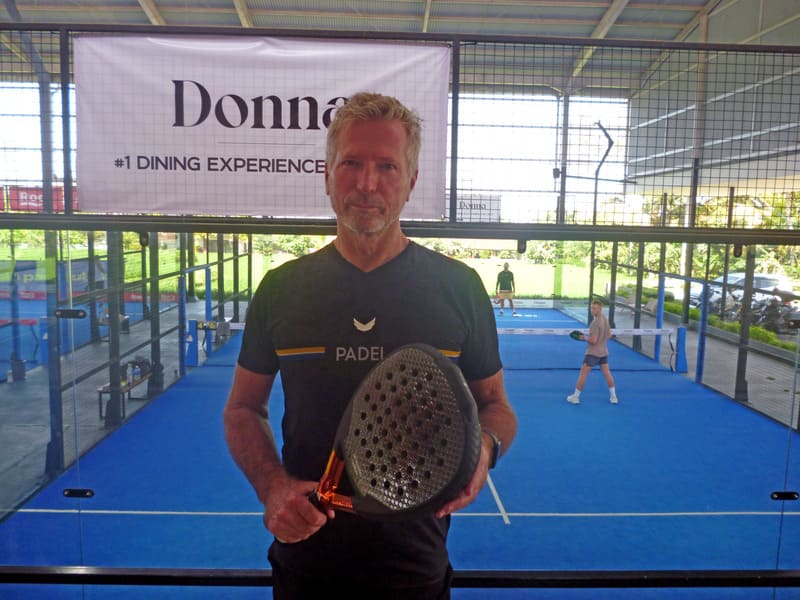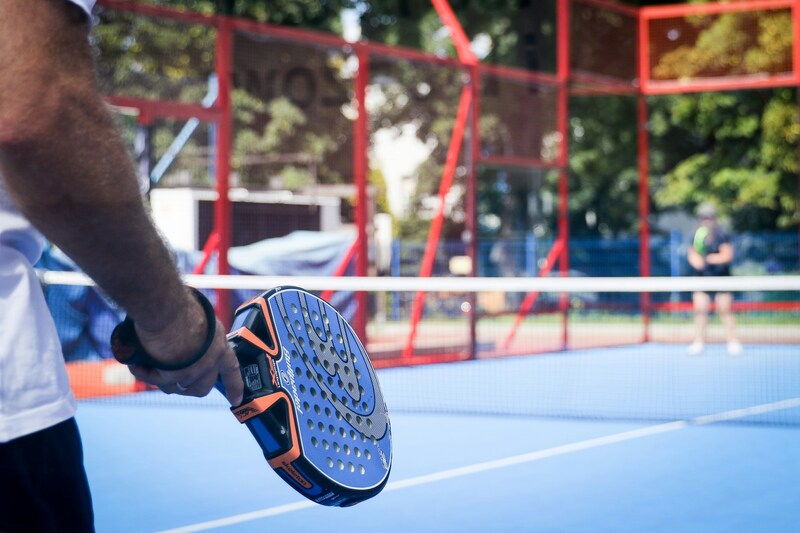Get to know the incredibly addictive racket sport that has swept across the globe, including the Island of Gods.
I’m sure you’ve heard about it, even if you’re not a fan of racket sports.
It’s this new sports craze with a rather unique origin because, for once, the US and UK have nothing to do with it. Indeed, it was invented in the 1960s by a businessman from Acapulco, Mexico, as the story goes if you conduct an online search. Drawing inspiration from squash and tennis, he created what is now known as “Padel”, an incredibly addictive racket sport that has swept across the globe and has evidently also made its way to Bali since the end of the COVID-19 pandemic.
Here’s an overview with insights from the best specialists on the island…
So, here I am at Jungle Padel Ubud, observing these compact courts, each 20m long and 10m wide, neatly aligned before me. Their sides are constructed of glass walls and wire fencing, which serve as in-play surfaces, adding a strategic element to the game, as I’ve read. Each time a ball ricochets off the court onto the glass wall, a resounding blast echoes, and the game continues. Typically played in doubles, this increasingly popular racket and ball sport was nurtured and developed in Spain. Only recently has it captured the hearts of many enthusiasts, notably in Europe, but not exclusively. Padel has now made its mark in Asia, with courts sprouting up everywhere, including Bali, a fact any resident on the island can attest to.
The man who pioneered the game in Bali joins me at my table, which overlooks the four courts of the newly built complex. He’s a friendly Italian who spent half his life in England. Toni Montesanti moved to Spain in 2014, where he discovered padel. Always a sports enthusiast, he fell in love with the game and returned to England a few years later with the idea of establishing a padel club there. Unfortunately, complicated regulations for public spaces and perhaps a bit of reticence towards this Latin sports invention made him change his mind. During the heavy UK pandemic lockdown, he took a 3-month break with his family in Bali, but 3 months became 3 years. In Bali, there was no padel, but he was craving to play, so together with his now business partners, all padel enthusiasts, they opened the first Padel Club in Indonesia, located in Pererenan, South Bali, on the 14th of February, 2022.
Where all coaches hail from Spain
“When we opened, it was like an instant tsunami of players; the market was ready,” Montesanti recalls. “However, we had to work diligently to maintain the momentum. We are a team of five main investors. We never really embarked on extensive marketing, just regular promotions. With dedication and passion, we spent most of our days reconnecting with people during the pandemic, through padel. Playing with them, introducing this new game, and nurturing the community. For more than a year, we were the only ones in Bali.” Since then, a federation has been established in Indonesia, and Montesanti is proud to mention that Jungle Padel trained the first Indonesian coach and was training the Indonesian National team players.
Eager to foster a house spirit, he also asserts that all staff across his various locations must learn to play padel.
“We see kids passing our multi-courts during the day, and we invite them in to learn the basics of the game. Initially, it was almost exclusively a foreigner’s sport, but considering that Indonesians are very strong in badminton, I knew that they would soon get strong in padel too. We’re aware that for locals, it’s perceived as a bit of an elite game. However, as of today, Indonesians have conquered 20% of the market,” Montesanti explains.
The Jungle Padel brand is now frequently sought after for franchising outside Bali, in big Indonesian cities, with leads also coming from overseas. The fastest-growing sport in the world even aims to be at the Olympics in 2032.
It’s a lifestyle, and the game is very addictive
Jungle Padel now boasts five open locations (Pererenan, Canggu, Ubud, Kerobokan, Kedungu) and has one under construction in Seseh. Their WhatsApp group has amassed over 2,000 regular users. They average 2,500 customers per month and have a total of 15,000 registered players. Their Instagram account has garnered over 8,000 followers. These are numbers that would make any investor ecstatic, considering the relatively recent establishment of these businesses on the island! Influencers and famous football players are now promoting this new game throughout the Indonesian archipelago, paving the way for an even brighter future following this impressive business start.
Montesanti rejoices and asserts with confidence: “It’s here to stay, all over the world. It’s a lifestyle, and the game is very addictive. Anyone can play and improve quickly.”
Major sports gear companies are now entering the market, offering an increasing variety of shoes, rackets, and other padel-related equipment. The price of rackets ranges from Rp1,500,000 to Rp7,000,000 — and the tech is rapidly improving.
I’m joined by Spanish coach Patricia, who is working here, in this area north of Ubud. As a former tennis player, she begins by explaining, “The scoring system in padel is similar to that of tennis, with points counted as 15, 30, 40, and game. A player wins a set after winning six games with a minimum 2-point lead. To win a match, a player or team must win two out of three sets.”
She also adds: “The great thing about padel is that it’s enjoyable regardless of your skill level. Whether you’re a beginner or already playing at a high level, you’ll have fun. This contrasts with tennis, which can be boring if you’re not playing at the best level.”
Patricia certainly knows what she’s talking about, as she teaches a diverse range of players with varying skill levels. Originally from Valencia, where she received her coaching certification, this occupation was initially just a side job to help fund her studies. A friend tipped her off about a potential coaching position on a distant tropical island, and that is how everything started, she recalls now while living her best life in Bali.
Maderson Ford, who has been coming to Bali for decades, albeit on a part-time basis, now sits with me. Originally from Sydney, Australia, this senior player with a squash background has become a stalwart at Jungle Padel Ubud. Having only discovered the game in September 2023, he now plays two times a day!
“Padel is incredibly addictive because anybody can play and have fun,” Ford tells me.
So, are you ready to surrender to this new racket game addiction?
For more info, you can also visit the following website: https://junglepadel.com




